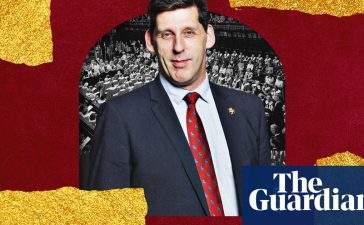Introduction: Britain gives go-ahead for Equinor to develop Rosebank oil field
Good morning, and welcome to our rolling coverage of business, the financial markets and the world economy.
Rosebank, the largest untapped oilfield in UK waters, has been approved by the UK government, sparking outrage from environmental campaigners.
Britain has given the go-ahead for Oslo-listed energy company Equinor to develop the oil and gas field in the North Sea, northwest of the Shetland islands.
Equinor, which holds a majority stake in Rosebank, will develop it with its British partner Ithaca Energy and invest $3.8bn. The field is expected to produce at least 300m, possibly up to 500m barrels of oil and is three times bigger than the controversial Cambo field that was put on hold more than a year ago.
A spokesman for the North Sea Transition Authority said:
We have today approved the Rosebank Field Development Plan (FDP) which allows the owners to proceed with their project.
The FDP is awarded in accordance with our published guidance and taking net zero considerations into account throughout the project’s lifecycle.
Rosebank is one of the most controversial energy projects, with hundreds of climate scientists and academics and more than 200 organisations from the Women’s Institute to Oxfam joining tens of thousands of people across the UK in opposition. Environmentalists argue that it contravenes Britain’s plan for a net zero economy.
Philip Evans, Greenpeace UK’s climate campaigner, said:
Rishi Sunak has proven once and for all that he puts the profits of oil companies above everyday people. We know that relying on fossil fuels is terrible for our energy security, the cost of living, and the climate. Our sky-high bills and recent extreme weather have shown us that.
The ugly truth is that Sunak is pandering to vested interests, demonstrating the stranglehold the fossil fuel lobby has on government decision making. And it’s bill payers and the climate that will suffer because of it. Why else would he make such a reckless decision?
This decision is nothing but carte blanche to fossil fuel companies to ruin the climate, punish bill payers, and siphon off obscene profits. We already have the solutions to cut bills, increase energy security and cut emissions, but the government ignores them in favour of handouts to corporations at the expense of the rest of us.
The news came as oil prices climbed by $1 a barrel, as markets worry about tight supplies heading into the winter and higher interest rates.
The oil producers’ cartel Opec, led by Saudi Arabia, and allies such as Russia have cut production and forecast supply shortfalls.
Brent crude rose more than 1% to $94.98 a barrel while US light crude is up 1.1% at $91.4 a barrel.
There are also concerns that higher interest rates could slow economic growth and reduce demand for oil. The US Federal Reserve has signalled that borrowing costs may need to be stay higher for longer than expected.
Separately, Hui Ka Yan, the billionaire chairman of the stricken property developer Evergrande, has been placed under police control, Bloomberg reported.
Hui was taken away by Chinese police earlier this month and is being monitored at a designated location.
It’s not clear why Hui is under so-called residential surveillance, a type of police action that falls short of formal detention or arrest and doesn’t mean Hui will be charged with a crime, Bloomberg said. This means he is unable to leave the location, meet or communicate with others without approval. Passports and identification cards must be handed to police but no longer than six months, according to the law.
Evergrande, the world’s most indebted property developer, is at the centre of a crisis in China’s property sector. A wave of defaults in the property sector has dragged down growth in China’s economy.
The Agenda
Key events
Closing summary
David Potts, the retailer who steered the supermarket chain Morrisons into private equity ownership, is stepping down after nine years as chief executive.
He will leave in November, and be succeeded by the former head of the grocery retailer Carrefour France, Rami Baitiéh.
Potts’s departure comes a little more than a year after the completion of the £7bn takeover of the retailer by the US private equity firm Clayton, Dubilier & Rice (CD&R) after an intense bidding war.
Britain has given the go-ahead to develop the UK’s biggest untapped oilfield off Shetland, sparking outrage from environmental campaigners.
The UK oil and gas regulator’s decision to grant the Oslo-listed Equinor and the British firm Ithaca Energy permission to develop the Rosebank oil and gas field in the North Sea was condemned by the Green party MP Caroline Lucas as “the greatest act of environmental vandalism in my lifetime”.
Our other main stories today:
Thank you for reading. We’ll be back tomorrow. Take care everyone! – JK
Olivia Cross, North America economist at Capital Economics, has looked at the 0.2% monthly rise in US durable goods orders in August and what it means for the US economy.
It was, at first glance, better than expected, but the outperformance was mainly due to a surge in defence aircraft orders. Admittedly, gains in core orders and underlying capital goods orders were even stronger. However, contractions earlier in the quarter mean that third-quarter business equipment investment growth probably slowed sharply…
Despite the improvement to underlying capital goods shipments, which feed directly into the BEA’s estimates, business equipment investment still looks set to slow sharply from the 7.7% annualised gain in the second quarter. Moreover, headwinds to the sector are likely to grow over the rest of the year as tighter credit conditions weigh more heavily on investment and economic growth weakens.
Christophe Barraud, chief economist at Bloomberg, tweeted:
*US AUG. DURABLE GOODS ORDERS INCREASE 0.2%; EST. -0.5% – BBG
*US AUG. DURABLES ORDERS EX-TRANS RISE 0.4%; EST. 0.2%
*US PRELIM AUG. NON-DEFENSE CAPITAL GOODS ORDERS EX-AIR RISE 0.9% M/M— Christophe Barraud
(@C_Barraud) September 27, 2023
Everyman cinema chain recovers after Barbie and Opppenheimer boost

Mark Sweney
Everyman said a weaker slate of films fuelled a widening of losses in the first half, but the runaway success of summer blockbusters Barbie and Oppenheimer has put the upmarket cinema chain back on track for the year.
Everyman, which runs 41 cinemas, reported a £4.3m pre-tax loss for the first six months of the year, up from £798,000 a year earlier.
The cinema operator saw losses balloon to more than five times the same period last year, as ticket sales declined from 1.8m to 1.6m and revenues fell 6% to £38.2m.
However, Alex Scrimgeour, chief executive at Everyman, re-iterated the company’s full year guidance praising the performance of the two summer blockbusters and a strong slate of films in the run up to Christmas.
The recent and resounding Box Office success of Barbie and Oppenheimer drove exceptional performance throughout July and August.
We remain confident in our prospects as we continue to be supported by a slate of high-quality second half releases.
Everyman said that when the “Barbenheimer” effect through the summer is factored in, revenues for the yeast to the end of August are up 13% over 2022 to 60.2m, while adjusted profits are up 12% to £11m.
The cinema chain said that the cost of living crisis that is forcing consumers to cut household budgets is not yet impacting movie-going. Average ticket prices are up from £11.32 in the same period last year to £11.49, while average food and beverage spend per head has climbed considerably, from £8.96 to £10.25.
Scrimgeour said:
Despite the current discretionary spend environment, we have continued to trade resiliently, highlighting our guests’ desire to be entertained.

10 former Wilko stores to reopen as Poundland on Saturday
Ten former Wilko stores are set to reopen as Poundland outlets this Saturday, after being bought out of administration by the value retailer.
Poundland owner Pepco agreed earlier this month to buy up to 71 Wilko stores from administrator PwC following the collapse of the high street chain.

Victoria Scholar, head of investment at interactive investor has looked at the changes at Morrisons.
Morrisons’ CEO David Potts is stepping down after nine years in the top job. He will be replaced by Rami Baitieh who was previously CEO of one of France’s largest food retailers, Carrefour.
Baitieh, who will take up the role in November, has many years of experience working in supermarkets. He marched his way up to the top job at Carrefour having previously held regional CEO roles. There will of course be major similarities but also differences between the supermarket sectors in France and the UK. Getting to grips with the UK market dynamics is likely to be among his first tests. But Morrisons certainly has confidence in him. Sir Terry Leahy, a senior adviser to CD&R and the former boss of Tesco said Morrisons is ‘poised for growth.’
Potts said there had been discussions about succession planning since the supermarket was bought by private equity firm CD&R in 2021. There were concerns at the time about the high levels of debt involved in the £7bn deal. In its first year in private equity hands, the company reported a pre-tax loss of £1.5bn including £400m in interest payment costs.
The reality though is that Morrisons has also struggled in terms of market share in recent years, weighed down by cost inflation. Aldi overtook and forced the supermarket out of the Big Four last year. In the latest Kantar figures, Morrisons’ market share stands at 8.6% versus the market leader Tesco with 27.2% and Aldi and Lidl with a combined 17.7% grip on the sector.
Morrisons is somewhat squeezed in the middle with intense competition from Tesco’s sheer size as well as the rock bottom prices on offer from the German discounters. The challenging economic backdrop with elevated inflation and higher interest rates has squeezed consumer budgets and impacted shoppers’ behaviour by making them increasingly price sensitive and on the hunt for bargains. Analysis from Which? showed that this behaviour pays off – some staple foods can cost as much as 910% more than the same product from a budget range. Aware of this, Morrisons has been desperately trying to remain competitive by announcing eight round of price cuts this year, reducing over 1000 prices since January.
The Tories’ huge new oilfield is a moral obscenity – but Rosebank can still be stopped, writes Caroline Lucas, co-leader of the Green party.
This is just the start,” said Rishi Sunak last week in his climate-wrecking speech from Downing Street. It certainly was just the start, because today, the government has sanctioned drilling in Rosebank, the biggest undeveloped oilfield in the North Sea.
This just 14 months after the UK’s hottest day, in July 2022. In that same month, the high court ruled the government’s net zero strategy unlawful, and ministers were ordered to redo their homework.
As the flames rise higher and the sirens grow louder, the day could – and should – have marked a genuine sea change in the government’s approach to the climate emergency. Its plan was failing – and the longer it continued to fail, the greater the price we would all pay.
But there was no such sea change. In fact, the government doubled down, with a green light for a new coalmine in Cumbria and now approval for Rosebank.
Let’s call out this latest act for what it is. Approving this oilfield is morally obscene; it is a climate crime for which the government must be held accountable. Burning Rosebank’s oil and gas would create more CO2 pollution than the combined emissions of 28 low-income countries, home to more than 700 million people. This field’s operational emissions alone would exceed the UK’s entire carbon budget allocated to oil and gas production.
US billionaire in talks over bid to buy Telegraph led by GB News co-owner

Mark Sweney
The American billionaire Ken Griffin, the founder of the Citadel hedge fund, is in discussions to join a group of investors led by Sir Paul Marshall, the co-owner of GB News, that is preparing a bid to buy the Telegraph.
Marshall, the founder of the London-based hedge fund Marshall Wace, is planning a bid through his UnHerd Ventures media group before an auction of the Telegraph and Spectator titles that is expected to begin in the coming weeks.
Citadel is one of the world’s most successful performing hedge funds, with more than $62bn (£51bn) under management. Griffin is estimated to have a personal fortune of $35bn, according to Forbes magazine.
Lloyds Banking Group, which seized control of the Telegraph and the Spectator in June after the owners, the Barclay family, failed to reach an agreement over the repayment of more than £1bn of debt, is using the investment bank Goldman Sachs to handle the auction.
Everton’s financial future could be in doubt unless takeover approved

Andy Hunter
Everton’s financial future could be in jeopardy unless the proposed takeover by the controversial US-investment firm 777 Partners is approved.
Everton’s debt and cashflow problems have increased considerably since the owner, Farhad Moshiri, stopped propping up the football club, with a recent loan from 777 Partners taking the total of outstanding loans above £350m. Interest on loans from Rights and Media Funding, MSP Sports Capital and 777 Partners is understood to be costing Everton more than £30m per year.
A loan of about £20m from 777, which has signed an agreement with Moshiri for his entire 94.1% shareholding, recently provided Everton with short-term working capital. That was required despite the club making a profit on player trading this summer and drastically reducing the head count, and wage bill, of Sean Dyche’s squad.

Saga, which sells cruises and insurance for people over 50, has been boosted by a rebound in demand for ocean and river cruises in recent months.
It expects to report better-than-expected profits for the full year as a result.
It reported a 15% rise in revenues for the six months to 31 July. It made a loss before tax of £77.8m, down from £262m a year earlier.
Evan Sutherland, the chief executive, said:
In Ocean Cruise, bookings are on track to achieve our targets for the full year, reflecting continued strong customer demand, while our River Cruise business has returned to profit with a 34% increase in guest numbers. Travel is also on track to return to profit for the full year.
In insurance, we continue to develop our business against the backdrop of a difficult inflationary market. While travel and private medical insurance are achieving strong year-on-year revenue growth, the performance in motor continues to weigh on earnings and this has resulted in an impairment of goodwill.
For the full year, we expect to achieve significant double-digit growth in revenue and underlying profit before tax when compared with the prior year, ahead of current estimates.

Morrisons names Rami Baitiéh as new CEO

Joanna Partridge
David Potts is stepping down as chief executive of private equity-owned supermarket chain Morrisons after nine years, and will be succeeded by the former chief executive of retailer Carrefour France.
Potts will step down from the top job in November, when Rami Baitiéh will take up the role.
Potts’ departure comes a little more than a year after the completion of the £7bn takeover of the retailer by the US private equity firm Clayton, Dubilier & Rice following an intense bidding war.
Morrisons said Baitiéh would “work closely with David Potts to ensure a smooth handover period.”
Potts’ departure comes after the supermarket’s most recent annual results, released in March, showed that it slumped to a £1.5bn loss during its first full year in private-equity ownership, revealing the grocers’ struggles after it was taken private.











